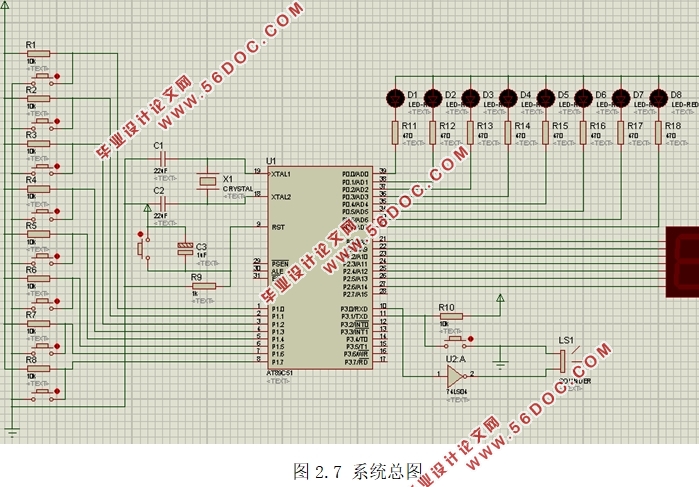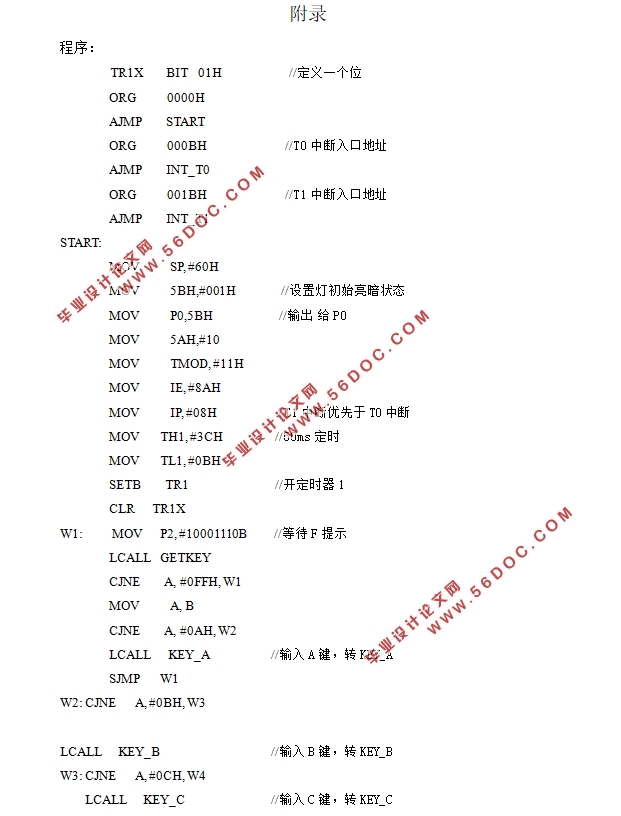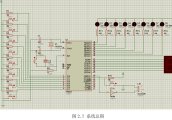基于单片机的音乐盒设计
来源:56doc.com 资料编号:5D21717 资料等级:★★★★★ %E8%B5%84%E6%96%99%E7%BC%96%E5%8F%B7%EF%BC%9A5D21717
资料以网页介绍的为准,下载后不会有水印.资料仅供学习参考之用. 密 保 惠 帮助
资料介绍
基于单片机的音乐盒设计(任务书,论文9200字)
摘要
随着科技发展的日新月异,单片机的应用越来越广泛。在单片机的应用系统中,是以单片机为核心,根据具体的硬件结构,结合相应的软件,形成一个系统。本文是利用单片机芯片,配以简单的外围电路,实现音乐播放和流水灯的控制。
本文主要研究了以AT89C51单片机为控制核心的音乐盒控制系统的结构,详细阐述了它的工作原理和设计方法。在硬件部分,包括了单片机的最小系统,按键输入,LED数码管显示,流水灯等外围电路的设计。在软件部分,包括了KEIL的开发环境,Protues的仿真,每个模块的程序设计以及程序的烧录。最后通过实际操作完成设计。
关键字:AT89C51单片机 音乐盒 KEIL
Design of Music Box Based On Single Chip Microcomputer
Abstract
Along with the rapid development in science and technology, SCM applications become more and more widely. In the MCU application system,based on the single chip processor as the core, according to the specific hardware structure, combined with the corresponding software, form a system. This paper is the use of single-chip microcomputer, match with simple peripheral circuit, realize music play and control the water lights.
This paper mainly studies the AT89C51 single chip microcomputer as the control core of music box structure of the control system, expounds its working principle and design method in detail. In the hardware part, including the single chip microcomputer minimum system, key presses, LED digital tube display, light water and other peripheral circuit design. In software part, including the KEIL development environment, Protues simulation, each module of the program design and program of record. Finally through the actual operation to complete the design.
Key words:AT89C51 single chip; music-box; KEIL


目录
摘要 I
Abstract II
目录 III
第一章 绪论 1
1.1 引言 1
1.2 设计方案 1
1.3 AT89C51单片机介绍 3
第二章 硬件电路设计 6
2.1 单片机最小系统设计 6
2.1.1 复位电路设计 6
2.1.2 时钟电路设计 6
2.2 键盘接口电路设计 7
2.3 LED数码管显示电路设计 7
2.4 蜂鸣器播放电路设计 8
2.5 流水灯电路设计 8
2.6 系统连接图 9
第三章 软件设计 10
3.1 软件工具的选择及简介 10
3.1.1 KEIL开发环境 10
3.1.2 Protues仿真 10
3.2 软件实现方法 11
3.2.1 主程序模块 11
3.2.2 定时中断模块 13
3.2.3 键盘控制模块 14
3.2.4 乐曲播放模块 20
第四章 系统实现与总结 24
4.1 实际应用 24
4.2 总结 27
致谢 28
参考文献 29
附录 30
|





